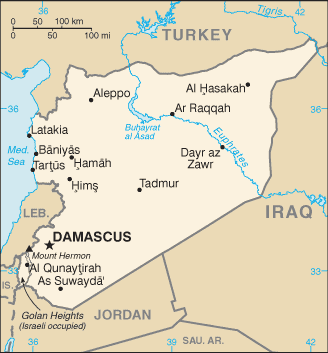After a solid year of the US-led coalition unsuccessfully fighting ISIS in Syria, nothing has been so unwelcome to the administration than recent media indications that Russia is looking to fight ISIS too, and in the complicated mess of factions that is Syria, two international anti-ISIS movements could quickly find themselves in a proxy war with one another.
 Paradoxically, the US is pressuring Russia to “fight ISIS” even as they express outrage at unconfirmed media reports that Russia might be upping their aid to the Assad government in a direct attempt to prevent them being outright overrun by ISIS forces. Russia, for it’s part, says it’s doing nothing new, providing aid to the Syrian government at the same levels as always.
Paradoxically, the US is pressuring Russia to “fight ISIS” even as they express outrage at unconfirmed media reports that Russia might be upping their aid to the Assad government in a direct attempt to prevent them being outright overrun by ISIS forces. Russia, for it’s part, says it’s doing nothing new, providing aid to the Syrian government at the same levels as always.
But the “fight” has to be on America’s terms, even if the terms the US has laid out publicly don’t make any sense, with the US nominally trying to destroy ISIS, destroy al-Qaeda, and destroy the Syrian government all at the same time, installing some non-existent pro-US faction in their place.
The reality of US policy is quite different, of course, with retired Gen. David Petraeus urging the US to more overtly start backing al-Qaeda as their preferred regime of choice in the nation, something Russia probably isn’t going to go for. Other members of the US coalition got there first, however, as despite public denials reports have been around for months that Turkey’s military has been aiding al-Qaeda in their gains in northwest Syria.
With that, the US opposition to Russia becomes more apparent, and sets the stage for a proxy battle by “US allies,” predominantly the al-Qaeda-led Islamist bloc, and the Russian-backed Syrian government, for the right to be the official internationally endorsed face of the war against ISIS, with Syria as the prize.
Russia’s suggestion of a unity government fighting ISIS, including both the existing Syrian government and secular rebels, was then a non-starter for the US, since the existing secular rebels are mostly irrelevant, and the al-Qaeda force that’s been doing the heavy lifting in the civil war from the start would be cut out of this deal.
Russia’s position makes sense from their perspective, as Russian interests in Syria are retaining them as a major ally in the Mediterranean, and retaining a naval base at Tartus. The US position seems primarily to exist in opposition to Russia’s position, which is why after years of talking up a largely fictional secular opposition they are edging closer to propping up al-Qaeda as America’s choice, simply because it’s not Russia’s choice.


